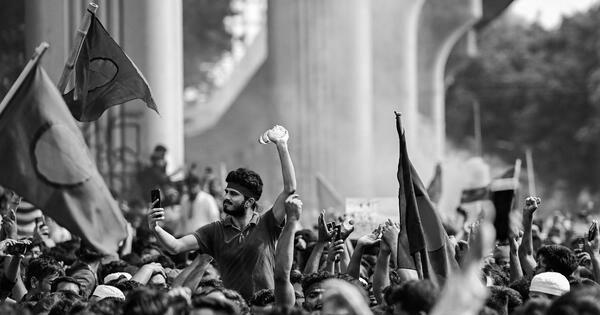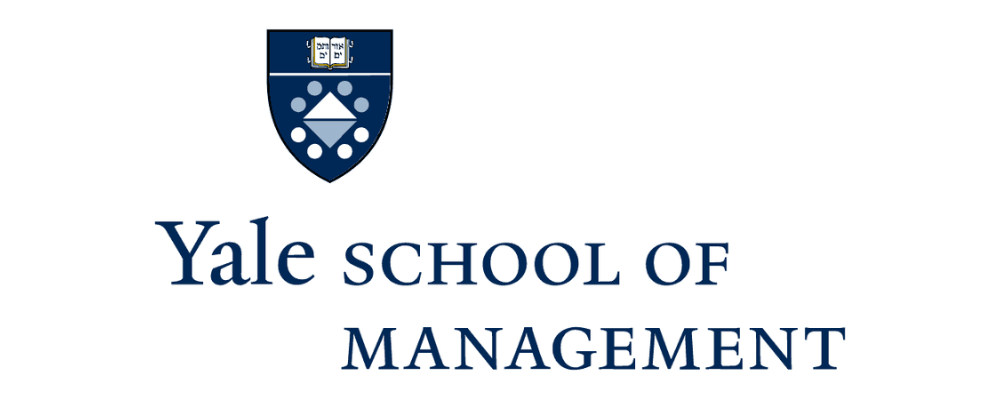
In July, student protests in Bangladesh grew violent when the country’s longtime and increasingly autocratic prime minister, Sheikh Hasina, initiated an aggressive crackdown that killed hundreds of demonstrators. This brutality caused what had started as discontent about unemployment among the country’s most educated young people to bloom into a wider movement against inequality, corruption, and antidemocratic leadership. In the early days of August, protestors defied curfews and internet shutdowns to swarm the streets of Dhaka, the capital of Bangladesh, ultimately surrounding Hasina’s residence and forcing the prime minister to abdicate her position and flee to India.
Manzur al Matin Pitom, a lawyer and television anchor who filed lawsuits in defense of student protestors, described scenes of unity and ordinary heroism as people from all walks of life joined what has now been dubbed the Monsoon Revolution. He recalled watching a student urging his mother, who had been protesting all day, to go home and rest. “The mother wasn’t even listening,” Pitom said. “She was tearing up a piece of clothing so her son could shield himself from the tear gas.”
Pitom was speaking at a conference at Yale SOM, “The Monsoon Revolution in Bangladesh,” which convened student protestors, academics, and policy experts to reflect on recent events and articulate tangible solutions for how the new government might reform corrupt institutions, conduct international relations, and revive Bangladesh’s ailing economy.
Prapti Taposhi, a protest leader who organized the first march of female students during the revolution, said that mothers brought meals to student demonstrators, and strangers handed her money to buy spray paint and other protest supplies. She learned that Hasina had fled the country while standing on the same street where she was arrested in 2018 during a previous student movement that laid the groundwork for the revolution.
“That moment was pretty emotional,” she said.
In the revolution’s aftermath, protestors worked with Bangladesh’s military to appoint microfinance pioneer and Nobel laureate Muhammad Yunus as leader of an interim government. That government faces the monumental task of overseeing free and fair elections after a fifteen-year period of authoritarian government and stabilizing the country’s precarious economy.
Mushfiq Mobarak, the Jerome Kasoff ’54 Professor of Management and Economics, led a panel discussion focused on reviving Bangladesh’s economy. He emphasized the connection between “the economic issues and the big political upheaval we just experienced… These two things cannot be divorced from each other.”
Commending protestors for the enormous feat of “ousting a dictatorial regime without taking up arms,” Mobarak urged panelists to articulate tangible solutions for the challenges ahead
“What should our strategy be?” he asked. “How do we actually make the economy run on a day-to-day basis?”
Challenges and Opportunities
Jyoti Rahman, an economist who has worked with the International Monetary Fund (IMF), outlined the challenges facing Bangladesh’s economy, as well as some signs of recovery that are already visible. One major issue is inflation, which had skyrocketed in the last years of Hasina’s regime. Citing the governor of Bangladesh’s central bank, Rahman said that inflation has already decreased since the revolution and is expected to fall from 10% to 7% in the next few years. However, he added, reducing inflation to a healthy level of around 5% will be more difficult, “because ultimately, inflation comes down to macroeconomic management, monetary policy, and fiscal policy coordination.” Implementing long-term macroeconomic policies will require Bangladesh to reach a point of greater political stability and appoint a new slate of financial officials to replace those who left their posts during the revolution or are considered too complicit in the previous regime to continue their work.
Rahman added that Bangladesh needs to stabilize its currency in order to assure international investors that “this is a country that can pay its bills.” In a country where millions of citizens have moved abroad for better jobs, currency stability depends in large part on remittances. Rahman said that official remittances had been low in the years leading up to the revolution, because Bangladeshi workers saw that the local currency was depreciating and chose to send money home through informal channels. This pattern created a “vicious cycle,” fueling further depreciation and even lower remittances. In the past few weeks, official remittances have increased, a good sign for Bangladesh’s economic future.
Soothing Foreign Investors
The IMF and other international financial organizations, as well as some Western governments, have signaled that they will support the country in its recovery. These assurances are important not just to leaders within the country, but also to foreign investors weighing the risks and benefits of doing business in Bangladesh. Nehad Chowdhury, the global head of sovereign credit management at Citigroup, offered insight into how financial institutions may be analyzing the country’s current economic position, noting that prior to 2022, Bangladesh outperformed other comparable emerging economies, even as the COVID pandemic spurred worldwide market volatility. The Russian invasion of Ukraine in 2022 caused global spikes in commodity prices and put pressure on Bangladesh, a net importer of many goods, helping to create the dire economic situation that preceded the revolution. Now, investors will be looking for “predictability and continuity,” Chowdhury said.
“What they want to see is near-term macro-stabilization following these very severe shocks that the economy has gone through,” Chowdhury said. Investors will also want to see signs that Bangladesh’s new leaders have a plan for returning the country to its previous economic performance, he added. “What are the deeper structural reforms that will inform a long-term investment thesis in Bangladesh? And does the leadership, whether it’s the interim government or a successive government, articulate a vision of how they’re going to maintain or improve that level of competitiveness going forward?”
The Garment’s Industry’s Role
Bangladesh’s economic focus on exporting ready-made garments for global brands like Walmart and H&M spurred rapid growth. However, the economy’s dependence on one industry may also have made it more vulnerable to shocks, such as when Russia’s invasion of Ukraine disrupted supply chains. Now, said Rubana Huq, the chairperson of a Bangladeshi business conglomerate with a focus in garment manufacturing, buyers are already moving away from Bangladesh because of uncertainty as to whether the country’s factories can stay open and meet production demand.
“The buyer is constantly chasing us for on-time shipment, and as much as they would like to sympathize with us, the market isn’t going to wait,” Huq said. She predicted that buyers looking to factories in nearby Pakistan, India, and Cambodia were by no means certain to return to Bangladesh eventually. “Once the buyer leaves the country, the market shifts.”
To salvage the garment industry, Huq argued, business owners within Bangladesh need to stop competing with each other and driving down the prices buyers are willing to pay. She also suggested that buyers are unlikely to put their trust in Bangladeshi factories until the country returns to political stability.
Mobarak argued against a singular focus on stability, noting that the sweeping political reforms protestors have demanded cannot be accomplished without upheaval. “The revolution was necessary, and revolutions necessitate the opposite of stability,” he said. “We have evidence that there were hundreds of millions of dollars, maybe billions, that were stolen from the country. Stability got us there.”
Other attendees challenged Huq for what they perceived as her lack of support for student protestors. A lively debate ensued, highlighting the difficulties of achieving peaceful reform and reconciliation after a period of authoritarian leadership, in a setting where business leaders, policymakers, and civil society must work together on political and economic reforms to embark on a path of stable growth. Huq appealed for unity, saying that “academia must join hands with the industry immediately” and proposing that think tanks be established to synthesize different perspectives and guide the country through future economic transitions.
Investing in People
Asked what kinds of human-capital investments can help return Bangladesh to its previous economic competitiveness, Abdoulaye Seck, the World Bank’s country director for Bangladesh and Bhutan, said that leaders need to support self-employed people, who constitute two thirds of the workforce. “Bangladesh should invest in its people, and trusting the young people of Bangladesh will deliver a lot.”
“The Yale School of Management is the graduate business school of Yale University, a private research university in New Haven, Connecticut.”
Please visit the firm link to site


